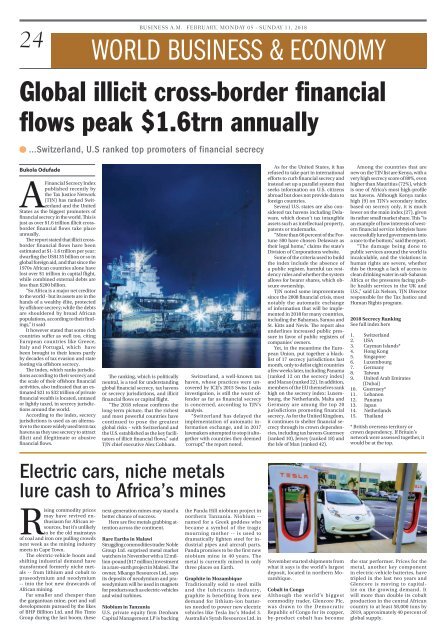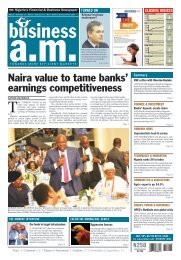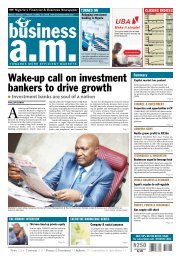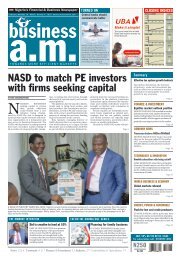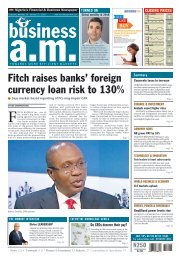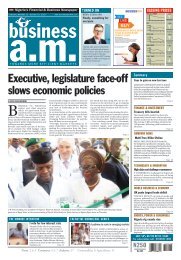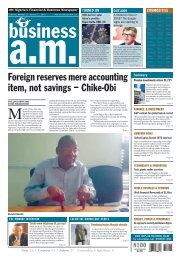Create successful ePaper yourself
Turn your PDF publications into a flip-book with our unique Google optimized e-Paper software.
24<br />
BUSINESS A.M. FEBRUARY, MONDAY <strong>05</strong> - SUNDAY 11, 20<strong>18</strong><br />
WORLD BUSINESS & ECONOMY<br />
Global illicit cross-border financial<br />
flows peak $1.6trn annually<br />
...Switzerland, U.S ranked top promoters of financial secrecy<br />
Bukola Odufade<br />
A<br />
Financial Secrecy Index<br />
published recently by<br />
the Tax Justice Network<br />
(TJN) has ranked Switzerland<br />
and the United<br />
States as the biggest promoters of<br />
financial secrecy in the world. This is<br />
just as over $1.6 trillion illicit crossborder<br />
financial flows take place<br />
annually.<br />
The report stated that illicit crossborder<br />
financial flows have been<br />
estimated at $1-1.6 trillion per year:<br />
dwarfing the US$135 billion or so in<br />
global foreign aid, and that since the<br />
1970s African countries alone have<br />
lost over $1 trillion in capital flight,<br />
while combined external debts are<br />
less than $200 billion.<br />
“So Africa is a major net creditor<br />
to the world - but its assets are in the<br />
hands of a wealthy élite, protected<br />
by offshore secrecy; while the debts<br />
are shouldered by broad African<br />
populations, according to their findings,”<br />
it said<br />
It however stated that some rich<br />
countries suffer as well too, citing<br />
European countries like Greece,<br />
Italy and Portugal, which have<br />
been brought to their knees partly<br />
by decades of tax evasion and state<br />
looting via offshore secrecy.<br />
The index, which ranks jurisdictions<br />
according to their secrecy and<br />
the scale of their offshore financial<br />
activities, also indicated that an estimated<br />
$21 to $32 trillion of private<br />
financial wealth is located, untaxed<br />
or lightly taxed, in secrecy jurisdictions<br />
around the world.<br />
According to the index, secrecy<br />
jurisdictions is used as an alternative<br />
to the more widely used term tax<br />
havens as they use secrecy to attract<br />
illicit and illegitimate or abusive<br />
financial flows.<br />
The ranking, which is politically<br />
neutral, is a tool for understanding<br />
global financial secrecy, tax havens<br />
or secrecy jurisdictions, and illicit<br />
financial flows or capital flight.<br />
“The 20<strong>18</strong> release confirms the<br />
long-term picture, that the richest<br />
and most powerful countries have<br />
continued to pose the greatest<br />
global risks – with Switzerland and<br />
the U.S. established as the key facilitators<br />
of illicit financial flows,” said<br />
TJN chief executive Alex Cobham.<br />
Switzerland, a well-known tax<br />
haven, whose practices were uncovered<br />
by ICIJ’s 2015 Swiss Leaks<br />
investigation, is still the worst offender<br />
as far as financial secrecy<br />
is concerned, according to TJN’s<br />
analysis.<br />
“Switzerland has delayed the<br />
implementation of automatic information<br />
exchange, and in 2017<br />
lawmakers attempted to stop it altogether<br />
with countries they deemed<br />
‘corrupt’,” the report noted.<br />
As for the United States, it has<br />
refused to take part in international<br />
efforts to curb financial secrecy and<br />
instead set up a parallel system that<br />
seeks information on U.S. citizens<br />
abroad but does not provide data to<br />
foreign countries.<br />
Several U.S. states are also considered<br />
tax havens including Delaware,<br />
which doesn’t tax intangible<br />
assets such as intellectual property,<br />
patents or trademarks.<br />
“More than 66 percent of the Fortune<br />
500 have chosen Delaware as<br />
their legal home,” claims the state’s<br />
Division of Corporations website.<br />
Some of the criteria used to build<br />
the index include the absence of<br />
a public register, harmful tax residency<br />
rules and whether the system<br />
allows for bearer shares, which obscure<br />
ownership.<br />
TJN noted some improvements<br />
since the 2008 financial crisis, most<br />
notably the automatic exchange<br />
of information that will be implemented<br />
in 20<strong>18</strong> for many countries,<br />
including the Bahamas, Samoa and<br />
St. Kitts and Nevis. The report also<br />
underlines increased public pressure<br />
in favor of public registers of<br />
companies’ owners.<br />
Yet, in the meantime the European<br />
Union, put together a blacklist<br />
of 17 secrecy jurisdictions last<br />
month, only to delist eight countries<br />
a few weeks later, including Panama<br />
(ranked 12 on the secrecy index)<br />
and Macao (ranked 22). In addition,<br />
members of the EU themselves rank<br />
high on the secrecy index: Luxembourg,<br />
the Netherlands, Malta and<br />
Germany are among the top 20<br />
jurisdictions promoting financial<br />
secrecy. As for the United Kingdom,<br />
it continues to shelter financial secrecy<br />
through its crown dependencies,<br />
including tax havens Guernsey<br />
(ranked 10), Jersey (ranked <strong>18</strong>) and<br />
the Isle of Man (ranked 42).<br />
Among the countries that are<br />
new on the TJN list are Kenya, with a<br />
very high secrecy score of 80%, even<br />
higher than Mauritius (72%), which<br />
is one of Africa’s most high-profile<br />
tax havens. Although Kenya ranks<br />
high (9) on TJN’s secondary index<br />
based on secrecy only, it is much<br />
lower on the main index (27), given<br />
its rather small market share. This “is<br />
an example of how interests of western<br />
financial service lobbyists have<br />
successfully lured governments into<br />
a race to the bottom,” said the report.<br />
“The damage being done to<br />
public services around the world is<br />
incalculable, and the violations in<br />
human rights are severe, whether<br />
this be through a lack of access to<br />
clean drinking water in sub-Saharan<br />
Africa or the pressures facing public<br />
health services in the UK and<br />
U.S.,” said Liz Nelson, TJN Director<br />
responsible for the Tax Justice and<br />
Human Rights program.<br />
20<strong>18</strong> Secrecy Ranking<br />
See full index here<br />
1. Switzerland<br />
2. USA<br />
3. Cayman Islands*<br />
4. Hong Kong<br />
5. Singapore<br />
6. Luxembourg<br />
7. Germany<br />
8. Taiwan<br />
9. United Arab Emirates<br />
(Dubai)<br />
10. Guernsey*<br />
11. Lebanon<br />
12. Panama<br />
13. Japan<br />
14. Netherlands<br />
15. Thailand<br />
* British overseas territory or<br />
crown dependency. If Britain’s<br />
network were assessed together, it<br />
would be at the top.<br />
Electric cars, niche metals<br />
lure cash to Africa’s mines<br />
Rising commodity prices<br />
may have revived enthusiasm<br />
for African resources,<br />
but it’s unlikely<br />
to be the old mainstays<br />
of coal and iron ore pulling crowds<br />
next week as the mining industry<br />
meets in Cape Town.<br />
The electric-vehicle boom and<br />
shifting industrial demand have<br />
transformed formerly niche metals<br />
-- from lithium and cobalt to<br />
praseodymium and neodymium<br />
-- into the hot new drawcards of<br />
African mining.<br />
Far smaller and cheaper than<br />
the gargantuan mine, port and rail<br />
developments pursued by the likes<br />
of BHP Billiton Ltd. and Rio Tinto<br />
Group during the last boom, these<br />
next-generation mines may stand a<br />
better chance of success.<br />
Here are five metals grabbing attention<br />
across the continent.<br />
Rare Earths in Malawi<br />
Struggling commodities trader Noble<br />
Group Ltd. surprised metal market<br />
watchers in November with a 12 million-pound<br />
($17 million) investment<br />
in a rare-earth project in Malawi. The<br />
owner, Mkango Resources Ltd., says<br />
its deposits of neodymium and praseodymium<br />
will be used in magnets<br />
for products such as electric-vehicles<br />
and wind turbines.<br />
Niobium in Tanzania<br />
U.S. private equity firm Denham<br />
Capital Management LP is backing<br />
the Panda Hill niobium project in<br />
northern Tanzania. Niobium --<br />
named for a Greek goddess who<br />
became a symbol of the tragic<br />
mourning mother -- is used to<br />
dramatically lighten steel for industrial<br />
pipes and aircraft parts.<br />
Panda promises to be the first new<br />
niobium mine in 40 years. The<br />
metal is currently mined in only<br />
three places on Earth.<br />
Graphite in Mozambique<br />
Traditionally sold to steel mills<br />
and the lubricants industry,<br />
graphite is benefiting from new<br />
demand for lithium-ion batteries<br />
needed to power new electric<br />
vehicles like Tesla Inc’s Model 3.<br />
Australia’s Syrah Resources Ltd. in<br />
November started shipments from<br />
what it says is the world’s largest<br />
deposit, located in northern Mozambique.<br />
Cobalt in Congo<br />
Although the world’s biggest<br />
commodity trader, Glencore Plc,<br />
was drawn to the Democratic<br />
Republic of Congo for its copper,<br />
by-product cobalt has become<br />
the star performer. Prices for the<br />
metal, another key component<br />
in electric-vehicle batteries, have<br />
tripled in the last two years and<br />
Glencore is moving to capitalize<br />
on the growing demand. It<br />
will more than double its cobalt<br />
production in the central African<br />
country to at least 58,000 tons by<br />
2019, approximately 40 percent of<br />
global supply.


